by Alicia Ashcroft
Luke Verhoeff was first diagnosed at age 3 1/2 with mild-to-moderate autism and global developmental delay (GDD). A non-speaker, he often felt trapped. “I didn’t know the way out,” he said. Following years of speech, vision, oxygen, neuro, physio, occupational, hearing and cranio-sacral therapies, Luke found his voice through a letterboard, which his family refers to as the “great awakening.”
Luke, now a TRU student, poet and one of the stars of the upcoming CBC series The Assembly, said it best: “Silence is not an option. You can be seen and heard without the need for spoken word.”
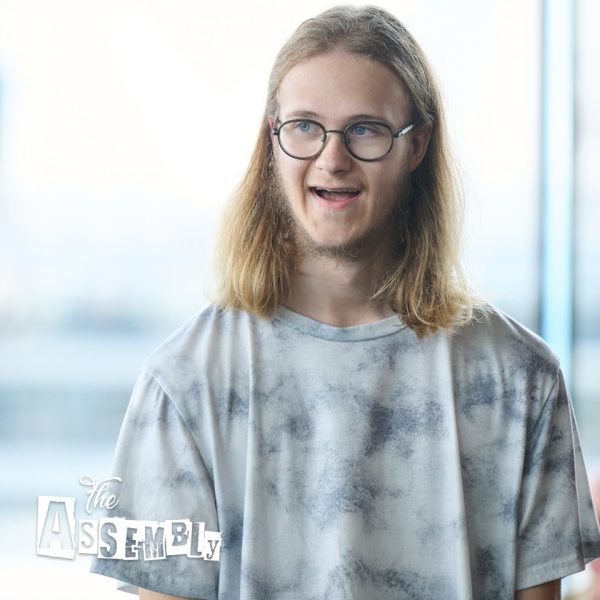
Luke Verhoeff as featured on the CBC’s The Assembly.
Luke was 17 when his mother, Sandra Verhoeff, first read Underestimated: An Autism Miracle by J.B. Handley and Jamison Handley, which first introduced the concept of letterboards.
Things really began to click when Madison Imber, a Rapid Prompting Method (RPM) Level 3 practitioner from Mentoring Minds, entered the picture. In her work, she helps individuals who are non-speaking, minimally speaking, or unreliably speaking to “find their voice, one letter at a time.”
Using the letterboard, Luke points to the letters one at a time, usually with a pencil. The practitioner helps guide his eyes and arm.
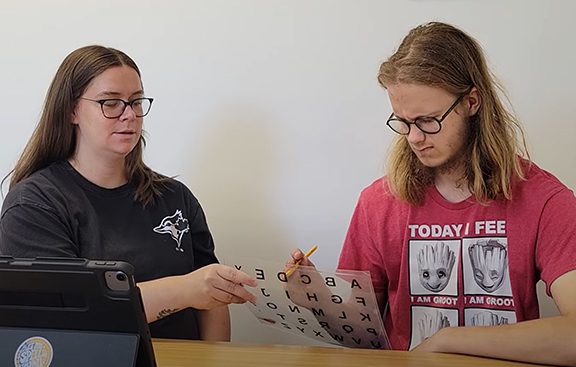
Through letterboard, Luke communicates one letter at a time.
“Within the first 20 minutes of the lesson with Madison, Luke said, ‘Hey, Mom,’” said Sandra. “I literally had hundreds of questions for Luke. I wanted to know what he wanted for Christmas — he asked for a tie-dye duvet cover. He told us he was a ‘max-chill hippie at heart’ who likes the ocean, values sustainability, wants to be a gardener and live off the land. Luke also loves history, Marvel movies, Star Wars, Survivor and a good murder mystery.”
Imber noted the breakthrough bridged gaps not only in communicating needs and preferences but also in self-expression, relational connection and understanding. “I watched as a mother and son deepened their bond and understanding of one another. I watched two brothers reach for each other and connect in a way that was more meaningful than they had ever done before. I watched as a father got to know his son, really know his son for the first time. Words don’t quite conceptualize the connections made that week.”
“Having a voice is the most powerful thing,” said Luke. “Being able to express myself has changed every aspect of my life. I have already accomplished many things I never thought I’d be able to do. Having a way to communicate is all that we non-speakers need – we can deal with the rest.”
With Luke’s increased independence, Sandra is learning how to create more space for her son’s voice. “Luke is my muse. He has a spiritual, poetic, artistic and creative soul. He’s a cool kid and an old soul. But the goal of motherhood is to let them go. Someone recently asked him a question, and I answered on his behalf. You can’t untrain that in just a couple of years when you’ve been doing it for almost two decades.”
After years of navigating medical and therapeutic systems, the Verhoeffs worked with psychologists, speech therapists, occupational therapists, physiotherapists, psychiatrists and counsellors. “No one really understood apraxia. Luke had a developmental-coordination disorder, which means his body is disconnected from his brain. We now know that the brain-to-body disconnect was why he felt trapped inside. I still have a lot of anger to work through because of the injustice of it, but we’re choosing the high road and taking action,” said Sandra.
The family has incorporated a society called Spellingway, which will support non-speakers, provide access to the letterboard, promote practitioners and facilitate financial support.
“If we can raise awareness or help another child, we’ve done our job. Luke wants to advocate for others like him, so they don’t have to go through what he went through. That’s what he says all the time: Everybody needs to be the change to see the change.”
The family recently gave a presentation to the Community Living British Columbia (CLBC) board of governors, which oversees all funding for adults with diverse abilities living in B.C. Sandra secured a meeting with Luke and CEO Ross Chilton, who spoke directly to Luke through the practitioner. “He’s a big fan of Luke’s, so he invited us to speak to the board at a big roundtable event. Luke has also been a guest speaker on a webinar, spoken to an elementary school class and now he’s on this national TV show, which is a big deal.”
As Luke’s world opens up, the excitement can become entangled with high anxiety. “When you’re a non-speaking introvert for 19 years, you need quiet time and space to absorb, digest and re-regulate,” Sandra said. “Now all of a sudden, he’s on centre stage, and that’s a lot to process.”
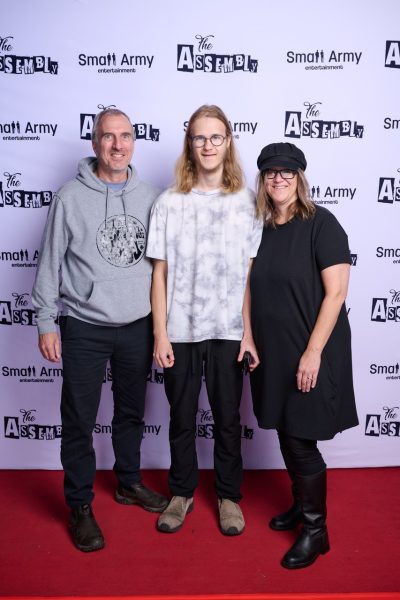
Dave (left), Luke and Sandra walking the red carpet at a recent CBC screening.
Luke is featured on the CBC television series The Assembly as part of a rotating cast of 47 autistic adults, interviewing top Canadian celebrities, including Jann Arden, Howie Mandel, Russell Peters, and Arlene Dickinson, over the course of six episodes. The TV programme drew inspiration from Le Papotin, a publishing collective of autistic writers and journalists that started in 1990. The series has now been commissioned in 19 countries, including the U.K. and Australia.
“I am very grateful for the exposure and experience”, Luke said. “I am pinching myself that non-speakers get to be a part of this, to have the opportunity to interview celebrities and for the world to see us in a new light. I am a part of something meaningful. I must admit, I feel overwhelmed. I never thought I would have this learning experience.”
Another recent highlight in Luke’s life: he completed ENGL 1001: Literature and Composition 1, an online course that explored 20th-century short stories and novels.
“It was a lot of work for him,” Sandra said, “I mean, it’s tough for any first-year. He was so proud of himself for finishing that course. He said it was one of the hardest things he’s ever done.”
While Google Read&Write or audiobook options sometimes suffice, Sandra would often read the stories aloud to Luke to keep the narrative varied and lively. When the time came to complete the assignments, Luke would work with a practitioner like Imber, who flew in from Calgary, to write each essay one letter at a time. “The papers are entirely written and edited in his head, so when they sit down together, Luke can plow through a 500-word essay in a couple of hours,” said Sandra.
With letterboards being a relatively new communication method, the Verhoeffs benefited from the advocacy of Matt Dyck, director of student experience and engagement within Student Services.
“Matt was with us every step of the way,” Sandra said. “As a parent of an autistic, non-speaking child, he understood what Luke and his support system needed and checked in regularly on our progress. Matt was incredibly supportive, encouraging, and excited, and I could barely talk about it without crying. That man is a true gem.”
“The power of even a single course can be transformative,” said Dyck. “That is, in essence, the spirit of Opening Learning (OL). Learning outcomes don’t have to be related to career; they can be about expanding your mind, opening your heart and sparking curiosity.”
Witnessing Luke’s journey was an inspiration to Dyck. “His words go beyond language. He reminds us that alternative forms of expression provide deep insight into the human condition. The most powerful voices aren’t necessarily heard, but rather deeply felt.”
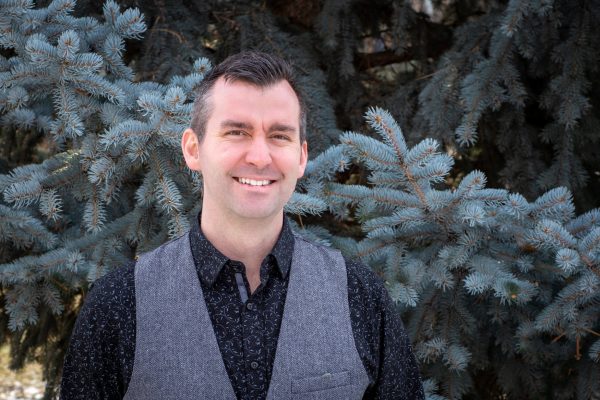
Working with Matt Dyck has been a highlight of Luke’s TRU experience.
Tapping into Luke’s inner world has allowed access to what Sandra refers to as “textbooks of information” inside his mind. It also provides a glimpse into the weight and pressure he experienced moving through the world without a voice.
“Luke knows he’s loved and looks back at his childhood with happiness, but he’s working through some trauma with a counsellor. He’s been alone for so long,” Sandra said. “He’s going somewhere no one’s ever gone before, and I think he often feels the pressure of trailblazing, as it can be tiring and lonely. He has no non-speaking mentors and no media figures to follow. All I want to do for him is give him safety, a safe space. And that’s our house, and that’s his dad. They are two peas in a pod.”
Luke said, “I couldn’t have done any of this without my very supportive family—I knew they knew I was in here, and I knew they were trying to get me out. Special thanks also to my practitioners, Madison and Brittney.”
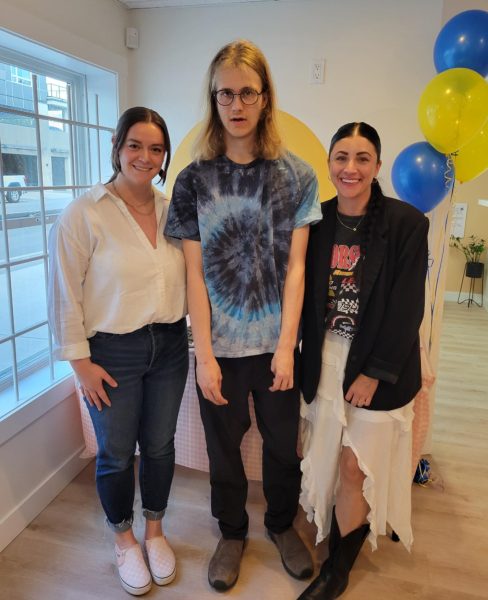
With the help of Madison (left) and Brittney, Luke’s communication skills are more robust than ever.
Luke has also been conducting research with the University of Calgary, testing virtual-headset prototypes. “They never tried it on anyone else, but they created a virtual letterboard and calibrated it to his eyes. They asked Luke to spell his name with his eyes. He spelled it so fast, we had to rewind the video to see that he actually did. That means his eyes are improving with the vision therapy we’re working on, because the brain can also be disconnected from the eyes. When Luke took the headset off and had finished the eye-gaze test, he started crying, which is rare. We asked him, ‘What’s going through your head?’ And he said, ‘I’m emotional because I can see my future.’”
Looking ahead, Luke envisions independence and interconnectedness, and in the final lines of his poem “Washed the Unknown,” he wrote, “I step forward, Onward, Upwards.”
“He’s got his own power now; he is his own person. The autonomy of making your own, even minute decisions throughout your day is extraordinary. Luke decides everything now,” Sandra said.
Through Mentoring Minds, Imber published Pointed Poetry, a collection of poems written by 19 autistic people from across western Canada who use the letterboard for communication. The book includes two of Luke’s poems. (Pointed Poetry Volume 2 will be available in mid-November 2025).
Luke and Sandra co-wrote a “cathartic” memoir that explores their history and background. “Our book is called Hopenstone because we will turn over every stone until we find what will give him autonomy. We’ll keep pushing for him. If he finds success, that’s a win for someone else,” Sandra said. “We will continue fighting from a grassroots level.”
Sandra, who spent 25 years as an auxiliary in marketing and communications at TRU (Dave also works at TRU in the enrollment services department), uses her graphic design expertise to build Luke’s online presence on thisisluke.ca. The website features Luke’s poetry, as well as poems and blogs from his support network, resources, photos, videos, an Etsy shop and information about The Assembly.
Luke shared these tips to help support non-speakers better.
- Talk to me like a 19-year-old. Cut the baby talk.
- Teach me age-appropriate concepts. I shouldn’t have to go looking for an education my peers are guaranteed.
- Support our learning in meaningful ways.
- Check your preconceived notions and meet me where I am.
- Don’t talk about me in front of me. Remember: no decision about us, without us.
- Spellers are the true experts. Providers have a ton of expertise, but this is my lived experience.
The Assembly debuts on CBC and CBC Gem on Nov. 6 at 9 p.m. Two half-hour episodes will air over three weeks, for a total of six episodes (Nov. 13 and 20).

